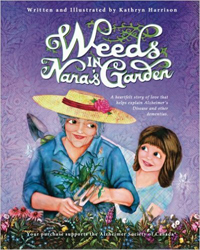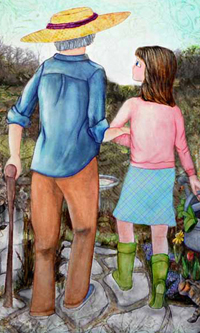| ________________
CM . . .
. Volume XXIII Number 5. . . .October 7, 2016

 |
Weeds in Nana’s Garden: A Heartfelt Story of Love that Helps Explain Alzheimer’s Disease and Other Dementia.
Kathryn Harrison.
Cobourg, ON: Flipturn Publishing (www.weedsinnanasgarden.com), 2016.
32 pp., pbk. & hc., $16.20 (pbk.), $20.00 (hc.).
ISBN 978-0-9949467-0-6 (pbk.), ISBN 978-0-9949467-1-3 (hc.).
Subject Headings:
Alzheimer’s disease-Juvenile fiction.
Dementia-Juvenile fiction.
Grandparent and child-Juvenile fiction.
Preschool-grade 4 / Ages 4-9.
Review by Chloe Humphreys.
***½ /4
|
| |
|

excerpt:
“Alzheimer’s is a type of dementia,” Mom continues.
“It causes unwanted tangles and other things to grow in Nana’s brain.”
“Kind of like the weeds growing in her garden?” I wonder, surprised.
“Yes! These tangles get in the way of Nana’s thoughts,” Mom says. “Her ideas can’t grow like they used to. Her memories get hidden. She mixes things up and forgets.”
With a deft mix of candidness and compassion, Weeds in Nana’s Garden, by Kathryn Harrison, tackles a difficult topic for many Canadian families: Alzheimer’s disease and dementia. It tells the tender story of a young girl and her beloved Nana. Together, the inseparable pair spends hours tending Nana’s lush garden by planting seeds in spring, picking flowers in summer, and raking leaves in fall. It is a truly magical place. Then, one summer day, the little girl notices that Nana’s garden has become unkempt and choked by weeds. She is scared and confused, wondering why Nana has let her garden become so overgrown. In answer to her worried questions, the girl’s mother gently explains that Nana has Alzheimer’s disease. Moving forward, the family tenderly supports one another through Nana’s developing illness, and they come to learn that love only grows stronger in the face of adversity.
 Using the garden metaphor as a tool to illustrate the progression of dementia, this picturebook explains Alzheimer’s disease to children in clear and sensitive terms. The book’s young narrator asks questions of her mom that echo real-world concerns that many children have about a family member with dementia, guiding young readers through the delicate process of understanding brain disease. To further support families, the book also includes a helpful Q&A section that answers questions like: “Who gets dementia?” and “Is there any medicine to help?”
Using the garden metaphor as a tool to illustrate the progression of dementia, this picturebook explains Alzheimer’s disease to children in clear and sensitive terms. The book’s young narrator asks questions of her mom that echo real-world concerns that many children have about a family member with dementia, guiding young readers through the delicate process of understanding brain disease. To further support families, the book also includes a helpful Q&A section that answers questions like: “Who gets dementia?” and “Is there any medicine to help?”
The writing is simple yet evocative as Harrison uses descriptive language to bring the girl’s surroundings and emotions to life. Typographically, phrases are easy to read in black and white text while song lyrics lend visual interest by playfully scrolling across the page. Harrison’s mixed-media illustrations showcase stunning vistas of Nana’s garden that shift from brightly coloured to more subdued as Nana’s dementia worsens. Children will enjoy looking for a cat and a group of fairies that appear on nearly every page. Characters have large eyes and wide mouths rendered in a slightly exaggerated style, emphasizing the many emotions they experience as a result of Nana’s illness.
In light of its strengths, Weeds in Nana’s Garden is an excellent resource to rely upon when discussing dementia with children, and it is a welcome addition to any library or classroom collection.
Highly Recommended.
Chloe Humphreys is a newly minted librarian with a passion for children’s literature and reading. She lives in beautiful Vancouver, BC.

To comment
on this title or this review, send mail to cm@umanitoba.ca.
Copyright © the Manitoba Library Association. Reproduction for personal
use is permitted only if this copyright notice is maintained. Any
other reproduction is prohibited without permission.
Next Review | Table of Contents For This Issue - October 7, 2016
CM Home | Back Issues
| Search
| CM Archive
| Profiles Archive
|

 Using the garden metaphor as a tool to illustrate the progression of dementia, this picturebook explains Alzheimer’s disease to children in clear and sensitive terms. The book’s young narrator asks questions of her mom that echo real-world concerns that many children have about a family member with dementia, guiding young readers through the delicate process of understanding brain disease. To further support families, the book also includes a helpful Q&A section that answers questions like: “Who gets dementia?” and “Is there any medicine to help?”
Using the garden metaphor as a tool to illustrate the progression of dementia, this picturebook explains Alzheimer’s disease to children in clear and sensitive terms. The book’s young narrator asks questions of her mom that echo real-world concerns that many children have about a family member with dementia, guiding young readers through the delicate process of understanding brain disease. To further support families, the book also includes a helpful Q&A section that answers questions like: “Who gets dementia?” and “Is there any medicine to help?”